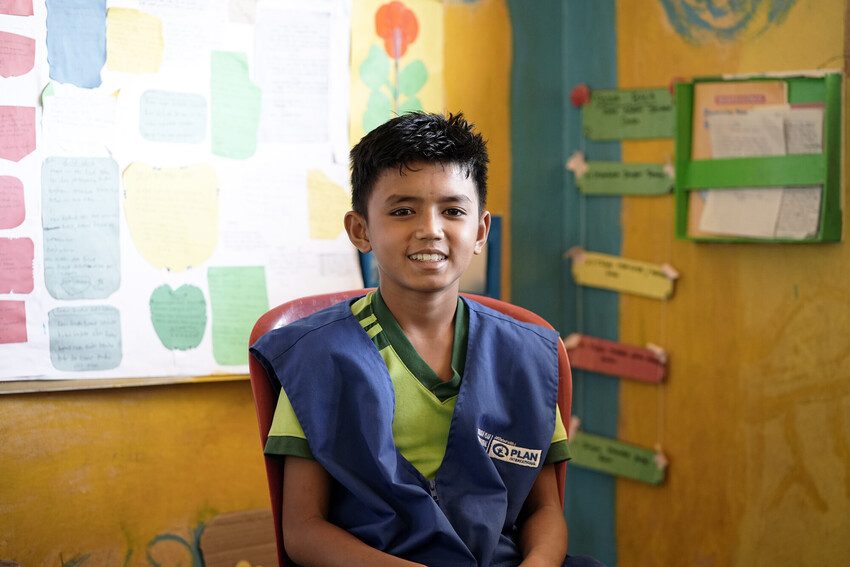The boy tackling period discrimination
Eleven-year-old Jeanes is tackling menstruation discrimination at his school, by sharing the facts about periods with others (especially boys) and embracing positive practices that promote gender equality.

Eleven-year-old Jeanes is proud to be a menstruation ally for girls in his school.
At Jeane’s school period discrimination is common and girls are often bullied during their periods. Jeanes is working to change this and is leading by example to educate his peers (especially other boys) on the realities of menstruation; championing new positive practices that promote gender equality in the school and even understanding the role parents play in bringing about positive change.
A boy’s role in removing period stigma
“If a girl is having her period, boys should not laugh at her, make fun of her, or insult her. This will certainly make girls feel less embarrassed when they have their period because this is normal.” This is the message that Jeanes shares with his fellow students, understanding that girls shouldn’t face discrimination during their period.
“Gender equality is important. It must be fought for because it is a way to improve girls’ lives.”
Jeanes
At Jeanes’ school in Manggarai Regency in East Nusa Tenggara province, girls often experience bullying when they have their period – especially during leaking incidents. This leads to feelings of shame and embarrassment and can result in girls staying at home when they are menstruating.
Jeanes understands that to bring about social change and end period discrimination, it’s important that boys understand more about menstrual health. He has embraced opportunities to learn more and share his learnings through his role as a peer educator.
“As a peer educator, I have taken part in various activities, including the menstrual hygiene management campaign which helps boys understand that girls and boys are equal.”
A young gender equality champion
“Gender equality is important. It must be fought for because it is a way to improve girls’ lives. I hope that by teaching girls and boys about gender equality, when they grow up, women will continue to be respected, especially by men,” says Jeanes.
By tackling the gender inequalities at his school, Jeanes is showing great courage as speaking up as a young person in conservative areas of Indonesia can be difficult. However, Jeanes is undeterred and says he will continue his efforts to stand up for girls’ rights.
“If a girl is having her period, boys should not laugh at her, make fun of her, or insult her.”
Jeanes
Jeanes explains how advocating for gender equality in schools is an essential way to bring about change. “Initiatives in school can stop gender inequalities. For example, daily classroom duties such as cleaning the classroom, sweeping, picking up rubbish and so on, should not just be done by girls.”
Another example of positive change at his school is the election of class president. “Before, the position of the class president had to be held by a boy, but now the class president can also be a girl,” shares Jeanes.
A parent’s role in creating a supportive menstrual environment
“Parents are often confused when explaining menstruation to their children. There are even parents who think that menstruation does not need to be explained to boys because it is inappropriate,” tells Jeanes.
Without realising it, these assumptions reinforce gender stereotypes and continue the cycle of inequality. It is hard to break myths about periods if parents themselves believe them. Hence, the need to also educate parents so they can correctly answer their children’s questions about periods.
Social attitudes to menstruation
In Indonesia, menstruation is a social taboo that is rarely discussed. A natural and normal biological process and a sign of good health – menstruation continues to be shrouded in taboos, myths, and misconceptions. This limited understanding means that girls often feel ashamed when they have their period – especially when they are teased by boys. Almost 1 in 7 girls miss 1 or more days of school due to their period.
To tackle the problem head on, Plan International works in schools to spark conversations about reproductive health, gender equality and menstruation. Training sessions are delivered by young peer educators who are standing up as period champions. Including boys is key to the success of the programme.
“I hope that by teaching girls and boys about gender equality, when they grow up, women will continue to be respected, especially by men.”
Jeanes
Categories: Sexual and reproductive health and rights


